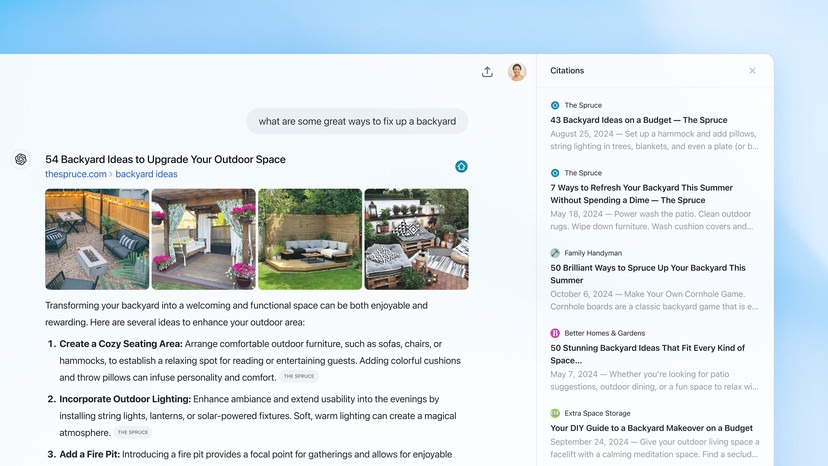ChatGPT has officially evolved into an AI-powered web search engine. Starting today, paid subscribers will have access to real-time information during conversations, with free, enterprise, and education users set to gain access in the coming weeks.
Rather than being introduced as a standalone product, the web search feature will be integrated directly into the existing ChatGPT interface. This integration allows the model to determine when to access web results based on user queries, although users can also manually initiate web searches. This update effectively bridges a significant competitive gap with other AI platforms such as Microsoft Copilot and Google Gemini, which have long provided real-time internet access in their interactions.
In a pre-launch demonstration, OpenAI’s ChatGPT search lead, Adam Fry, showcased the feature by searching for information about Apple’s stock and related news. The search results included an interactive stock graph, details about upcoming earnings, and news articles, complete with clickable citations leading to the original sources. Additionally, a sources sidebar displayed relevant websites that users could scroll through. In another instance, Fry searched for Italian restaurants in San Francisco, which generated an interactive map featuring recommended dining options. He also demonstrated how users could ask follow-up questions to refine their results, such as seeking more casual neighborhood eateries.
This new search functionality will be accessible across all ChatGPT platforms, including iOS, Android, and desktop applications for macOS and Windows. According to Fry, the search capability was developed using a combination of search technologies, prominently featuring Microsoft’s Bing. The feature was initially released as a prototype named SearchGPT to 10,000 test users back in July. Earlier reports indicated that OpenAI was actively recruiting Google employees to enhance its own search team.
Before this update, ChatGPT’s knowledge was limited to data collected up until 2021 or 2023, depending on the model. OpenAI spokesperson Niko Felix explained that even with the live search feature now operational, the company plans to continually update its training data to ensure users have access to the latest advancements. However, he emphasized that this process is distinct from the ongoing training of the company’s models.
The timing of this launch is notable as AI-driven search technologies gain traction among tech giants. Meta is reportedly working on its own AI search solution, while Google has expanded its AI features to over 100 countries. When questioned about the timing of this release coinciding with Alphabet’s recent earnings report—which revealed $49.4 billion in Q3 search revenue—Fry insisted that the launch was independently scheduled.

One clear advantage for users choosing ChatGPT over Google Search is the absence of advertising clutter or promoted queries at the top of results. While Google generates significant revenue from advertising in its search results, Fry stated that there are currently “no plans” for advertisements in ChatGPT. Nonetheless, operating AI-powered search can be more costly than traditional search methods, and the specifics of how OpenAI plans to finance this service for free users remain uncertain. Felix noted that free users will face “some limits on how often they can use our latest search models.”
Many AI search services are currently grappling with legal challenges. News Corp and The New York Times have filed lawsuits against the AI search startup Perplexity, accusing it of “massive freeriding” and copyright violations on a large scale. The New York Times has also sued OpenAI for allegedly using its materials to train its large language models. In light of these legal concerns, Fry pointed to the company’s partnerships with news organizations, emphasizing that OpenAI is working closely with its partners to responsibly use content and produce positive outcomes for publishers. He also noted that publishers can easily opt out of OpenAI’s web crawler, which will not bypass paywalls.
Over the past year, OpenAI has established partnerships with a range of media organizations, including Hearst, Condé Nast, Axel Springer, and News Corp. While Fry stated that these partners would gain more “control” over how their content is presented in ChatGPT, they will not receive automatic prioritization in search queries.
Regarding potential inaccuracies or “hallucinations” in AI-generated responses—such as when Google’s AI inaccurately advised users to put glue on their pizza—Fry expressed confidence that ChatGPT’s web search capabilities would enhance factual accuracy. He explained that many inaccuracies arise from not having access to the latest information, and with real-time search functionality, the model can make more informed decisions about what constitutes the correct answer. He acknowledged that mistakes are inevitable but promised transparency if errors occur.
With the launch of ChatGPT’s web search occurring just days before the U.S. presidential election, ensuring accuracy is more crucial than ever. Fry expressed hope that the tool would help elevate authoritative sources for election-related information, noting that the company is paying “special attention” to queries related to the election.
